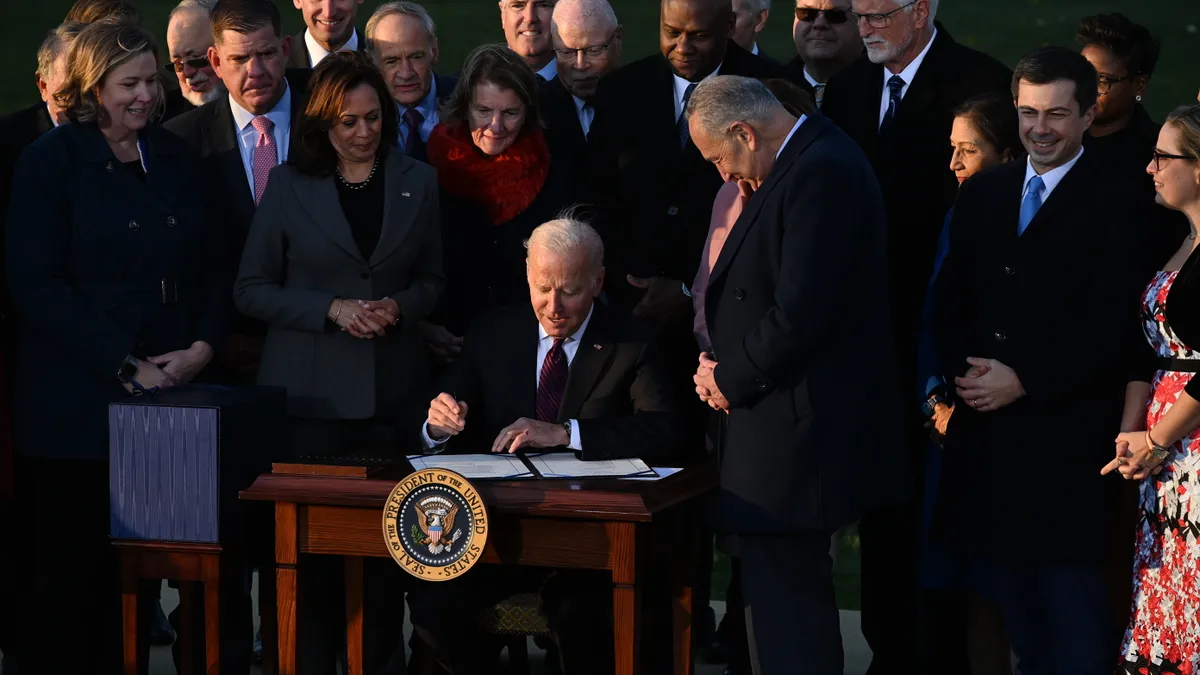Port congestion and extended transit times during the pandemic exposed longstanding supply chain inefficiencies. For many, the hurdles shippers face today are a symptom of a larger problem: The U.S. has chronically underinvested in the infrastructure needed to speed up the flow of goods.
Now, President Joe Biden's administration says that's about to change after he signed a $1.2 trillion infrastructure bill into law on Monday. "Instead of pointing fingers, we're seeing folks start to work together: railroads, ocean liners, labor, state and local governments," the president said during his visit to the Port of Baltimore.
Trade associations wasted no time touting the benefits the new law is expected to bring. Here are some highlights.
American Association of Port Authorities President and CEO Chris Connor
"The goods that flow through our ports touch every state, every Congressional district, every neighborhood, every home in our country. Our ports move the economic blood in our veins.
"The idea of dedicated Federal funding for ports is only two years old, and now the Federal Government is updating our national freight policy."
American Trucking Associations President and CEO Chris Spear
"After countless hearings and meetings on Capitol Hill, ATA members will finally see the fruits of their labor—a 38% increase in road and bridge funding, and an infusion of highly-trained, younger talent into our workforce."
Association of American Railroads President and CEO Ian Jefferies
"As we collectively face today's challenges and build tomorrow's opportunities, this package will help pave the way for a more modern, safer and resilient infrastructure network.
"The Infrastructure Investment and Jobs Act includes nearly $845 million per year for highway-rail grade crossing safety and elimination projects and an average of $5.55 billion per year for discretionary infrastructure grant programs, including $1 billion per year for the Consolidated Rail Infrastructure and Safety Improvement (CRISI) grant program, which provides essential support to short line and passenger railroads as well as state departments of transportation. Finally, the bill includes significant funding for research, development and demonstration projects that will play an important role in creating and further refining technologies that will help railroads to continue reducing their greenhouse gas emissions and further address climate change."
National Air Transportation Association President and CEO Timothy Obitts
"This bipartisan legislation provides $500 million a year for general aviation airports through the Airport Improvement Program, allocates an additional $100 million for the Contract Tower Program, and authorizes a new transportation workforce outreach program—important steps toward modernizing our physical infrastructure and strengthening our skilled workforce."
Coalition for America's Gateways and Trade Corridors Chairman Paul Hubler
"A new $3 billion grant program for railroad crossing eliminations will help reduce collisions, fatalities and injuries and improve reliability at scores of crossings in Southern California located along transcontinental freight rail routes. Significantly increased funding for highway improvements will help ease traffic-clogged roadways and interchanges in the Los Angeles region that are choke points in the nation's highway freight network."
National Association of Manufacturers President and CEO Jay Timmons
"For manufacturers, this is a victory years in the making. In 2016, the NAM released our 'Building to Win' plan, which called for exactly this type of bold infrastructure investment. It has guided our advocacy with administrations and legislators of both parties, and the leadership of President Biden and senators from both parties produced a bill that achieved many of our 'Building to Win' goals without raising tax rates on manufacturers. And this bipartisan approach can be a model for future legislation—one that puts policy above politics, personality or process."
National Retail Federation President and CEO Matthew Shay
"As the Infrastructure Investment and Jobs Act now becomes law, this historic investment and reform will enable America's transportation and broadband network to capitalize on growing consumer demand as well as sustain future disruption challenges."
Consumer Brands Association President and CEO Geoff Freeman
"This legislation is a monumental step forward, but it cannot solve the immediate supply chain crisis that is hampering the economy and driving increased costs for American families. With the looming potential of shortages of essential goods, we encourage Congress and the Biden administration to stay focused on what can be done to fix problems now. Consumer Brands put forward a set of immediate policy recommendations and will continue to act as a partner to the administration to ease supply chain bottlenecks and ensure consumers have access to products they depend on every day."













